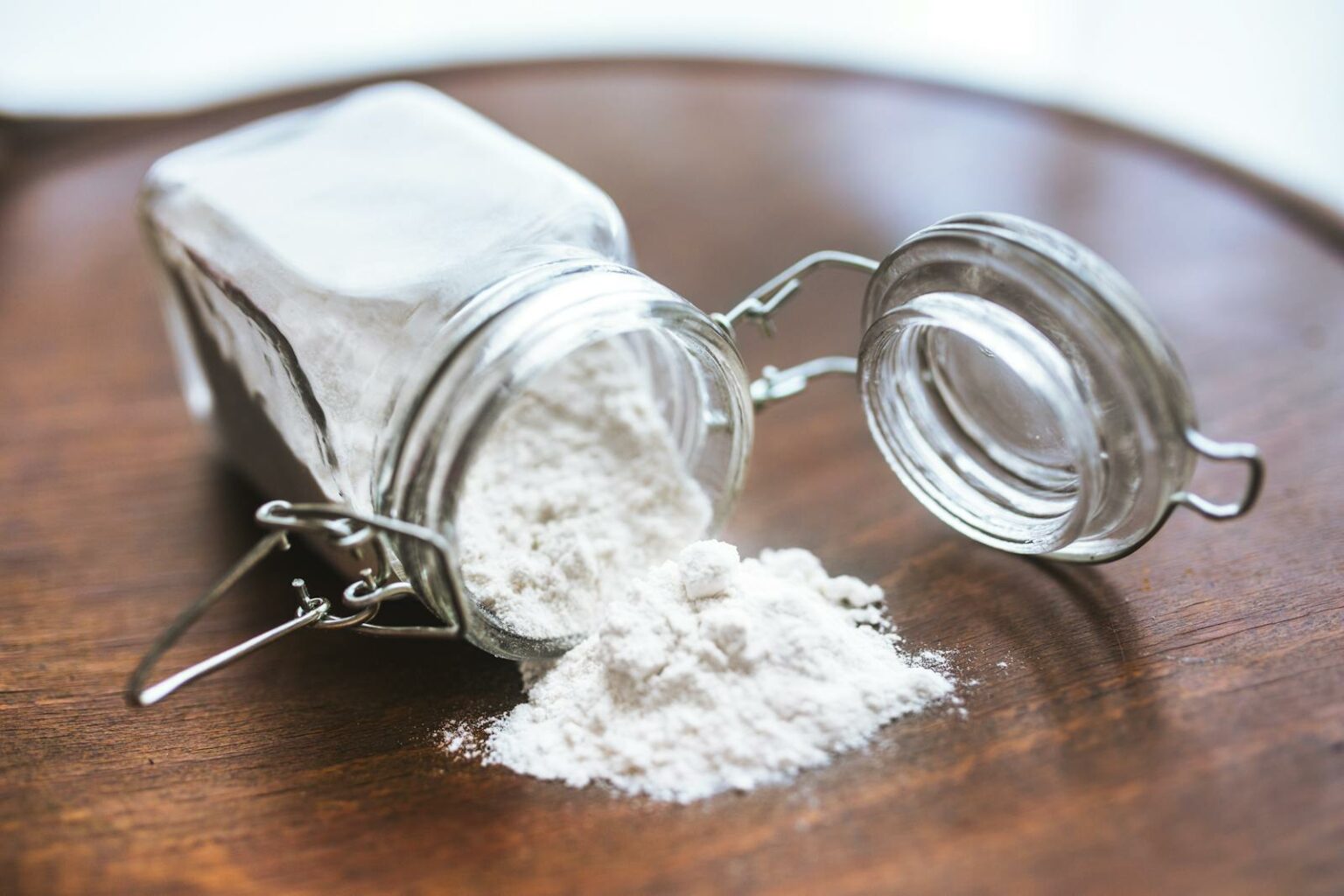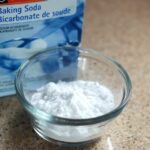Understanding Grey Hair
Before delving into the effects and potential uses of baking soda on grey hair, it’s essential to understand what causes hair to grey and the structure of grey hair.
What Causes Grey Hair
Grey hair is a natural part of aging that everybody experiences at different stages and rates. Contrary to some misconceptions, grey hair is not a result of a deficiency of any specific nutrient, so there’s no specific dietary intervention that can prevent or reverse grey hair.
The color of hair is determined by a pigment called melanin produced in the hair follicles. As we age, these follicles gradually produce less melanin, leading to a decrease in pigment and causing the hair to turn grey. The exact age and rate at which this occurs vary from person to person and can be influenced by a variety of factors, including genetics and lifestyle choices.
Despite various home remedies and treatments touted to reverse or prevent grey hair, there is currently no scientific evidence to support these claims. This includes the use of baking soda, for which there is no relevant scientific study demonstrating its theoretical benefits for hair, including preventing or reversing grey hair (Clinicana). If you’re concerned about grey hair, it’s best to consult with a healthcare professional to discuss any potential underlying health conditions or lifestyle factors that may be contributing to the graying of your hair (Harvard Health Publishing).
The Structure of Grey Hair
The structure of grey hair is essentially the same as pigmented hair, with the main difference being the lack of melanin. This absence of pigment leaves the hair looking grey or white. It’s important to note that baking soda acts externally and cannot influence hair color or alter melanin production, thus it cannot eliminate grey hair.
Grey hair can have a different texture compared to pigmented hair, often appearing coarser or more wiry. This change in texture is due to structural changes in the hair follicle as we age, not the lack of pigment.
Understanding the nature of grey hair and debunking the myths about factors influencing its onset is crucial. Equipped with this knowledge, you’re now prepared to explore the effects of baking soda on grey hair, its potential benefits, and downsides.
Baking Soda and Grey Hair
When it comes to the relationship between baking soda and grey hair, a few key benefits and uses emerge. Let’s delve into these further to better understand what baking soda does to grey hair.
The Effects of Baking Soda on Hair
Baking soda, a commonly found household item, has several effects on hair that can be particularly beneficial for grey hair.
-
Removal of Discoloration: Baking soda can help remove yellow discoloration from grey hair, leaving it looking more vibrant and silver (Healthline).
-
Restoration of Natural Color: By removing build-up and residue from hair products, pollution, and hard water, baking soda can help restore the natural color of grey hair.
-
Exfoliation of Scalp: Baking soda can act as a gentle exfoliant for the scalp, helping to remove dead skin cells and promote healthy hair growth (Green Matters).
-
Balancing pH Level: The alkaline properties of baking soda can help balance the pH level of the scalp and hair, promoting a healthier scalp and preventing common hair issues like dandruff.
-
Lightening of Hair: Baking soda has natural bleaching properties that can help to lighten the hair, potentially reducing the appearance of grey hair (Green Matters).
-
Removal of Yellow Tones: Baking soda can help remove yellow or brassy tones from grey hair, leaving it looking brighter and more vibrant.
How to Use Baking Soda on Grey Hair
Baking soda can be used in multiple ways on grey hair. Here’s a simple method:
-
Baking Soda Shampoo Alternative: Baking soda can be used as a natural shampoo alternative for grey hair. It can effectively cleanse the hair without stripping away natural oils. To use, mix one part baking soda with three parts water to create a paste. Apply this paste to your hair and scalp, leave in for a few minutes, and then rinse thoroughly.
-
Baking Soda as a Clarifying Agent: Baking soda works as a clarifying agent, removing product buildup and excess oil from the hair, which can contribute to dullness and discoloration. To use, mix a teaspoon of baking soda with your regular shampoo and wash your hair as usual.
Remember, while baking soda has many potential benefits for grey hair, it’s important to use it sparingly and not replace your regular hair care routine with baking soda treatments. Always follow with a conditioner or hair mask to replenish moisture, as baking soda can be drying.
The Potential Benefits of Baking Soda
The use of baking soda in hair care, particularly for grey hair, has gained popularity due to its potential benefits. Let’s take a closer look at how baking soda can brighten grey hair and act as a scalp exfoliant.
Brightening Grey Hair with Baking Soda
One of the primary benefits of baking soda is its ability to help remove yellow discoloration from grey hair, leaving it looking more vibrant and silver. This is achieved by the removal of build-up and residue from hair products, pollution, and hard water, which can dull the natural color of grey hair. In this way, baking soda can help restore the natural color of your grey hair.
In addition, baking soda can be used as a natural shampoo alternative for grey hair, as it can effectively cleanse the hair without stripping away natural oils. This is particularly beneficial for grey hair, which can often become dry and brittle with the use of harsh shampoos.
Baking Soda as a Scalp Exfoliant
Apart from brightening grey hair, baking soda also acts as a gentle exfoliant for the scalp. It helps to remove dead skin cells, promoting healthy hair growth and a well-maintained scalp.
Furthermore, the alkaline properties of baking soda can help balance the pH level of the scalp and hair. This promotes a healthier scalp environment and can help prevent common hair issues like dandruff. By maintaining a balanced pH level, the scalp is better equipped to manage oil production and maintain moisture, both of which are crucial for the health and appearance of grey hair.
In conclusion, the use of baking soda offers multiple potential benefits for grey hair, from brightening and restoring the natural color to promoting a healthy scalp environment. However, like any other product, it is important to use baking soda in moderation and in conjunction with other nourishing hair care practices to ensure the best results. It’s also recommended to perform a patch test before using baking soda on your hair or scalp to rule out any potential allergic reactions.
The Downsides of Baking Soda
While baking soda can offer certain benefits to grey hair, it is critical to understand that it can also have some damaging effects. This is crucial in order to make an informed decision about your hair care routine.
Damaging Effects of Baking Soda
Baking soda can seriously damage hair health, leading to irritation, frizz, and brittle hair. It can also damage the hair fibers, thanks to its high pH level, which can remove the natural oils that protect the skin and cause it to dry out (Clinicana).
Moreover, washing your hair with baking soda can disrupt the natural pH balance of your scalp and cause further damage. It is an aggressive substance that can lead to irritation, itching, and other damages to your hair and scalp.
To give you an idea of how baking soda can affect your hair health, consider the fact that baking soda has a pH level of 9, much higher than the pH of the skin and scalp, which is around 5.5. This high pH can cause a range of issues, including irritation, frizz, damage to hair fibers, and brittle hair.
When to Avoid Baking Soda
Given these potential damaging effects, it is recommended to use baking soda sparingly on grey hair, as excessive use can lead to dryness and damage. If you are considering incorporating baking soda into your hair care routine, it is best to first consult a professional hair stylist.
Additionally, if your scalp or skin is sensitive or prone to irritation, it may be best to avoid using baking soda altogether. The high pH level of baking soda can cause irritation and dryness, particularly in those with sensitive skin.
In summary, while baking soda can have certain benefits for grey hair, it’s important to understand its potential downsides and use it with caution. Always consult a professional before making significant changes to your hair care routine, and remember that the health of your hair and scalp comes first.
Alternatives to Baking Soda
While using baking soda might seem like a quick fix for managing grey hair, it’s not the most effective or healthiest choice for your hair and scalp. Baking soda can alter the scalp’s pH, damage hair fibers, and cause irritation and itching. Instead, consider exploring professional treatments and natural remedies for addressing grey hair.
Professional Treatments for Grey Hair
For those looking for a more effective solution, professional treatments can be an excellent choice. These treatments, offered by hair care professionals, are specifically designed to address the unique challenges of grey hair, including color changes, texture shifts, and moisture loss.
-
Hair Dyeing: Hair dyeing is a common solution for grey hair. Professionals can help you choose a color that complements your skin tone and achieves your desired look.
-
Hair Gloss Treatment: A hair gloss treatment can add shine and vibrancy to grey hair. It’s a semi-permanent treatment that can also help smooth out the hair’s texture.
-
Deep Conditioning Treatments: Deep conditioning treatments can help combat the dryness often associated with grey hair. These treatments replenish moisture and nutrients, leaving your hair softer and healthier.
Remember, it’s important to have a consultation with a hair care professional to determine which treatment is best suited for your hair type and condition.
Natural Remedies for Grey Hair
If you prefer a more natural approach, there are a number of home remedies that can help manage grey hair. While they may not eliminate grey hair, they can help improve the overall health and appearance of your hair.
-
Coconut Oil and Lemon Juice: A mixture of coconut oil and lemon juice can help moisturize your hair and scalp, potentially improving the texture and shine of grey hair.
-
Amla Oil: Amla oil, also known as Indian gooseberry oil, is often used to promote hair health. It’s rich in antioxidants and nutrients that can help nourish your hair.
-
Fenugreek Seeds: Fenugreek seeds are known for their potential hair benefits. You can soak the seeds overnight, grind them into a paste, and apply it to your hair and scalp.
While these natural remedies can help manage grey hair, it’s important to remember that results may vary, and what works for one person may not work for another. Always do a patch test before applying any new product or ingredient to your hair or scalp.
In conclusion, while baking soda is not the best solution for managing grey hair, there are plenty of professional treatments and natural remedies that can help. Always consult with a hair care professional to find the best solution for your specific needs.





